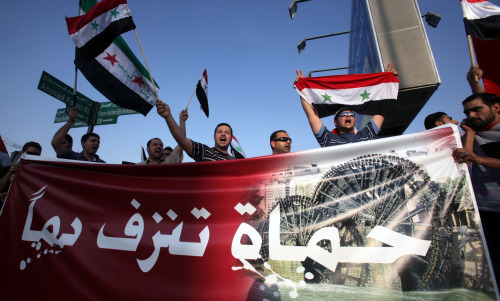EU, Washington condemn deadly crackdown during the month of Ramadan
BRUSSELS (AP) ― The European Union expanded its sanctions against Syria on Monday, imposing asset freezes and travel bans against five more military and government officials.
The EU decision brings the number of individuals targeted by the EU to 35, including President Bashar Assad. Four government entities are also on the list.
The EU said it would release the names of the new additions to the list on Tuesday.
 |
Syrians in Jordan rally against Assad’s regime in front of the Syrian embassy in Amman on Sunday. (Xinhua-Yonhap News) |
In Washington, President Barack Obama said the latest attacks on anti-government demonstrations in Syria, launched as the Muslim holy month of Ramadan began, were “outrageous.” U.S. Secretary of State Hillary Rodham urged Assad “to stop the slaughter now.”
At the United Nations, the U.N. Security Council, which has been deeply divided over Syria, met behind closed doors at Germany’s request to discuss a revised European-drafted resolution backed by the United States that has been languishing since late May that would condemn the Syrian government’s attacks against civilians. It has faced opposition from Russia, China, India, South Africa and Brazil.
India’s U.N. Ambassador Hardeep Singh Puri, this month’s council president, said he detected “a certain convergence of thinking, concern about the escalating violence.” He said members would meet again Tuesday morning to discuss the draft resolution and other proposals, possibly for a weaker council statement.
On Monday, Syrian forces shelled the city of Hama for a second day and fired at worshippers heading to Ramadan prayers. Violence on Sunday left 74 people dead throughout the country, 55 of them from Hama and nearby, according to rights groups.
It was one of the bloodiest days since the uprising against Assad’s authoritarian rule in Syria began in mid-March. More than 1,600 civilians have been killed in a crackdown on largely peaceful protests since a popular uprising began in Syria in mid-March.
EU foreign policy chief Catherine Ashton condemned Syria’s crackdown on pro-democracy protesters. Attacks by the security forces showed that the leadership is “unwilling to implement the reforms it has promised in response to the legitimate requests of the Syrian people,” Ashton said.
The European Union also has an embargo on sales of arms and equipment that can be used to suppress demonstrations.
“I wish to remind the Syrian authorities of their responsibility to protect the population,” Ashton said. “The brutal violence creates a serious risk of escalating tension and factional divisions and is not consistent with broad reforms.”
“We are keeping the situation under constant review and we will continue with this policy of putting pressure ― economic pressure and political pressure ― on the Syrian regime,” spokesman Michael Mann said.
In Paris, French Foreign Ministry spokeswoman Christine Fages said political, military and security officials in Syria “must know, now more than ever, that they will have to be held accountable for their acts.”
French government spokeswoman Valerie Pecresse, after a weekly Cabinet meeting Monday, said France was also calling on the U.N. Security Council to “condemn this violence” over the weekend in Syria.
Security Council members opposed to a resolution have so far refused to condemn Damascus for its crackdown, partly because they fear that it may be used as a pretext for armed intervention against Syria. They say a resolution allowing the use of all means to protect the civilian population in Libya has been misused by NATO to justify five months of airstrikes against Moammar Gadhafi’s regime.
“I think that’s a canard,” U.S. Ambassador Susan Rice told reporters Monday. “In my opinion, it’s an excuse by those who don’t want to confront what’s happening in Syria.”
But Russia’s U.N. Ambassador Vitaly Churkin said: “We are still under the shadow of events in Libya where we found a resolution adopted by the Security Council dealt with very frivolously, and we cannot but keep that in mind as we contemplate what the Security Council can and cannot do on Syria.”
Churkin said he was encouraged at “expressions of desire to have a common approach” by council members, but he said adopting a resolution would be “somewhat excessive.” Instead, he said Russia would favor a weaker council statement “which would be seen as a strong signal to end violence but also to come to terms politically and to move things forward peacefully in Syria.”
Amnesty International also urged the Security Council to take action over the Syria bloodshed and to refer the culprits to the international war crimes court.
“It’s clear that ... Assad is unwilling to halt his security forces, so the U.N. must take decisive action to stem this violent campaign of repression,” said Amnesty International’s Deputy Director Philip Luther.
Britain’s foreign secretary, William Hague, called for tougher sanctions against Assad’s government, but cautioned that military action was “not a remote possibility.” He said such sanctions had to come from both Western nations, and Arab countries and regional powers like Turkey.
Turkish Foreign Minister Ahmet Davutoglu condemned the continued crackdown on Syria’s protesters, saying nobody can remain silent when “more than 100 people were killed in one day.”








